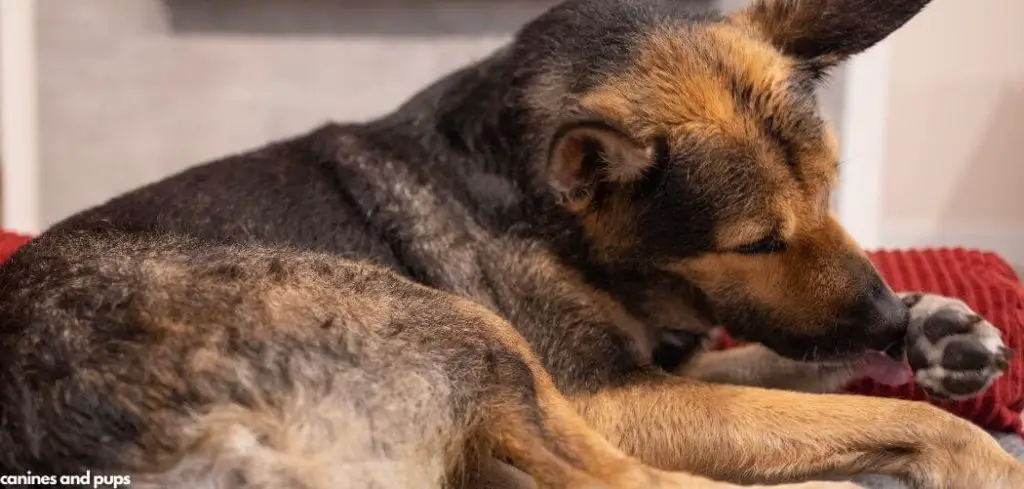When a dog is excessively licking and biting its paws, it can be more than just a quirky habit. This behavior often points to discomfort or even pain that needs attention.
We outline the common causes of excessive paw licking and biting in dogs, what you can do, and when to seek veterinary help.
.
Dog Excessively Licking and Biting Paws — Why It Happens
When a dog excessively licks and bites their paws, it usually indicates that something is irritating or hurting your dog’s paws or skin. Common causes include allergies, infections, parasites, injuries, or even stress-related behaviors.
Some dogs also develop this habit due to underlying pain or arthritis, especially if one paw is more affected than the others.
While sometimes mild, this behavior can worsen quickly and lead to raw, inflamed skin or secondary infections if left untreated.

Dog Excessively Licking and Biting Paws: Common Causes
Allergies
Allergies are one of the leading reasons dogs lick and bite their paws. Environmental triggers like pollen, mold, or dust mites can make paws itchy. Food allergies may also cause inflammation that leads to persistent licking.
Dogs often focus on their paws because allergens collect there after walking outside.
Signs may include redness, hair loss, or dark staining on the fur from constant licking. Without treatment, allergies can make a dog miserable and cause recurring infections.
Read more: Dog Drooling Excessively and Licking Paws (What it could mean)
Parasites
Fleas, mites, or ticks can cause intense itching that drives a dog to chew at its paws. Even a single flea bite can set off an allergic reaction in sensitive dogs.
Mites, such as those that cause mange, burrow into the skin and create relentless irritation. Alongside paw biting, you may see scabs, sores, or general restlessness.
Parasites need to be treated quickly to prevent spreading and to ease the severe itchiness.
Infections
Both bacterial and yeast infections are common on dog paws. Moisture between the paw pads creates the perfect environment for microbes to thrive.
When an infection develops, the paw may become red, swollen, and foul-smelling. Dogs will lick and bite persistently in an attempt to soothe the irritation. Some dogs may also limp or avoid putting weight on the paw.
Left untreated, infections can worsen and spread, making early treatment essential.
Injuries or Foreign Objects
A cut, thorn, or even a lodged splinter can cause a dog to obsessively lick its paw. Sometimes, small pebbles or burrs get stuck between the toes and create irritation.
The licking is the dog’s natural attempt to clean or remove the object. However, too much licking can make the injury worse and delay healing.
Checking the paws regularly after outdoor walks can help catch these problems early.
Pain or Arthritis
Dogs with joint pain or arthritis may lick or bite at their paws or legs as a way to cope with discomfort. Nerve pain or orthopedic issues can cause the same behavior.
Often, the licking is concentrated on one paw or leg. You may also notice stiffness, limping, or difficulty rising after rest.
This type of licking is a signal that your dog is trying to manage deeper pain rather than a surface irritation.
Stress and Anxiety
Some dogs lick or bite their paws as a coping mechanism for stress or anxiety. This is similar to a person biting their nails.
Situations like being left alone, exposure to loud noises, or lack of mental stimulation can trigger this repetitive behavior. Over time, it can become a compulsive habit that damages the skin.
Stress-induced licking should be addressed early to prevent long-term harm.
What to Do If Your Dog Is Excessively Licking and Biting Their Paws
Begin by gently inspecting your dog’s paws. Look for cuts, swelling, redness, or any foreign objects stuck between the toes. If you find something minor like a burr, carefully remove it and clean the area with mild antiseptic.
Keep your dog’s paws clean and dry, especially after outdoor walks. Wiping them with a damp cloth can remove allergens and irritants. Using hypoallergenic shampoos during baths may help if skin allergies are suspected.
For stress-related licking, providing toys, more exercise, or calming routines may reduce the behavior.
In some cases, protective booties or an Elizabethan collar can help prevent further paw damage while you address the cause.
If the problem continues, avoid home remedies without veterinary guidance, as paw conditions often require specific treatment like antifungals, antibiotics, or allergy management.
When to Call or Visit Your Vet
Contact your vet promptly if the paw licking is relentless, leads to hair loss, or causes open sores. These signs suggest infection or an ongoing issue that needs treatment.
Seek immediate veterinary care if your dog’s paw is swollen, bleeding, or very painful. Sudden onset of excessive licking may also indicate a foreign body or injury.
If your dog shows additional symptoms like limping, lethargy, or refusal to eat, this could point to a deeper health concern that requires medical attention.
Persistent licking and biting is never something to ignore, as it usually indicates that your dog is uncomfortable or in distress.
Read more: Dog licking paws excessively (When to worry)
Key Takeaway
Dog excessively licking and biting paws is a sign that something is wrong, whether it’s allergies, parasites, infections, injuries, or even stress. While some causes are mild and manageable at home, others require prompt veterinary attention.
Catching the issue early can prevent infections, pain, and long-term complications.
If your dog’s symptoms persist or worsen, reaching out to your veterinarian is the best step toward helping your dog feel comfortable and healthy again.
